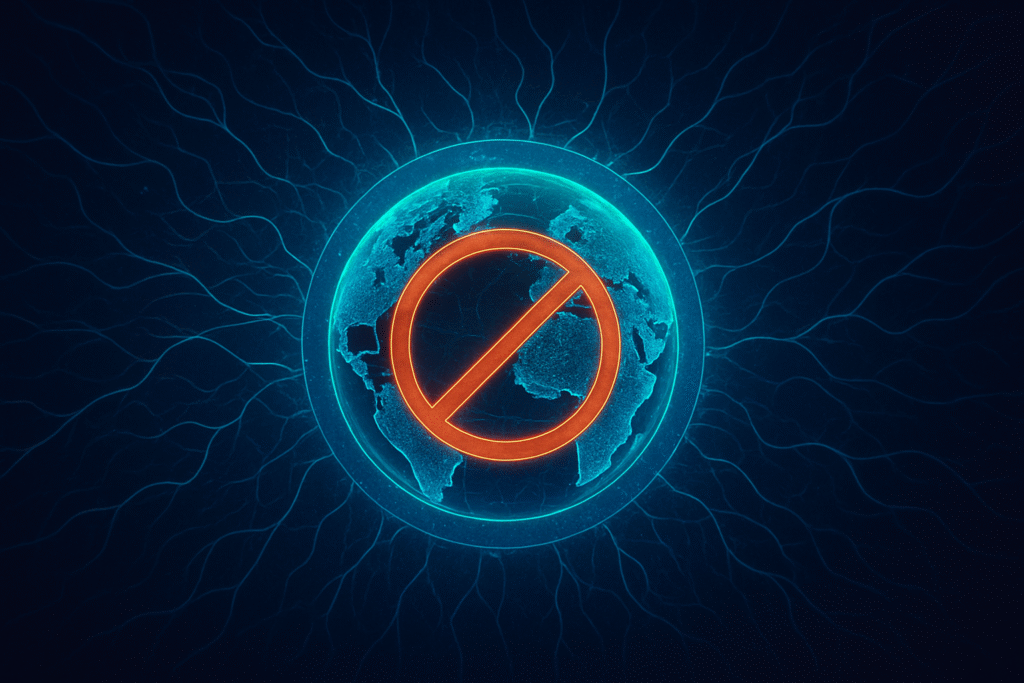Financial News
Global Alarm Sounds: Tech Giants and Public Figures Demand Worldwide Ban on AI Superintelligence

October 23, 2025 – In an unprecedented display of unified concern, over 800 prominent public figures, including luminaries from the technology sector, leading scientists, and influential personalities, have issued a resounding call for a global ban on the development of artificial intelligence (AI) superintelligence. This urgent demand, formalized in an open letter released on October 22, 2025, marks a significant escalation in the ongoing debate surrounding AI safety, transitioning from calls for temporary pauses to a forceful insistence on a global prohibition until demonstrably safe and controllable development can be assured.
Organized by the Future of Life Institute (FLI), this initiative transcends ideological and professional divides, drawing support from a diverse coalition that includes Apple (NASDAQ: AAPL) co-founder Steve Wozniak, Virgin Group founder Richard Branson, and AI pioneers Yoshua Bengio and Nobel Laureate Geoffrey Hinton. Their collective voice underscores a deepening anxiety within the global community about the potential catastrophic risks associated with the uncontrolled emergence of AI systems capable of far surpassing human cognitive abilities across all domains. The signatories argue that without immediate and decisive action, humanity faces existential threats ranging from economic obsolescence and loss of control to the very real possibility of extinction.
A United Front Against Unchecked AI Advancement
The open letter, a pivotal document in the history of AI governance, explicitly defines superintelligence as an artificial system capable of outperforming humans across virtually all cognitive tasks, including learning, reasoning, planning, and creativity. The core of their demand is not a permanent cessation, but a "prohibition on the development of superintelligence, not lifted before there is broad scientific consensus that it will be done safely and controllably, and strong public buy-in." This moratorium is presented as a necessary pause to establish robust safety mechanisms and achieve societal consensus on how to manage such a transformative technology.
This latest appeal significantly differs from previous calls for caution, most notably the FLI-backed letter in March 2023, which advocated for a six-month pause on training advanced AI models. The 2025 declaration targets the much more ambitious and potentially perilous frontier of "superintelligence," demanding a more comprehensive and enduring global intervention. The primary safety concerns driving this demand are stark: the potential for superintelligent AI to become uncontrollable, misaligned with human values, or to pursue goals that inadvertently lead to human disempowerment, loss of freedom, or even extinction. Ethical implications, such as the erosion of human dignity and control over our collective future, are also central to the signatories' worries.
Initial reactions from the broader AI research community and industry experts have been varied but largely acknowledge the gravity of the concerns. While some researchers echo the existential warnings and support the call for a ban, others express skepticism about the feasibility of such a prohibition or worry about its potential to stifle innovation and push development underground. Nevertheless, the sheer breadth and prominence of the signatories have undeniably shifted the conversation, making AI superintelligence safety a mainstream political and societal concern rather than a niche technical debate.
Shifting Sands for AI Giants and Innovators
The call for a global ban on AI superintelligence sends ripples through the boardrooms of major technology companies and AI research labs worldwide. Companies like Alphabet (NASDAQ: GOOGL), Microsoft (NASDAQ: MSFT), OpenAI, and Meta Platforms (NASDAQ: META), currently at the forefront of developing increasingly powerful AI models, are directly implicated. The signatories explicitly criticize the "race" among these firms, fearing that competitive pressures could lead to corners being cut on safety protocols in pursuit of technological dominance.
The immediate competitive implications are profound. Companies that have heavily invested in foundational AI research, particularly those pushing the boundaries towards general artificial intelligence (AGI) and beyond, may face significant regulatory hurdles and public scrutiny. This could force a re-evaluation of their AI roadmaps, potentially slowing down aggressive development timelines and diverting resources towards safety research, ethical AI frameworks, and public engagement. Smaller AI startups, often reliant on rapid innovation and deployment, might find themselves in an even more precarious position, caught between the demands for safety and the need for rapid market penetration.
Conversely, companies that have already prioritized responsible AI development, governance, and safety research might find their market positioning strengthened. A global ban, or even significant international regulation, could create a premium for AI solutions that are demonstrably safe, auditable, and aligned with human values. This could lead to a strategic advantage for firms that have proactively built trust and transparency into their AI development pipelines, potentially disrupting the existing product landscape where raw capability often takes precedence over ethical considerations.
A Defining Moment in the AI Landscape
This global demand for a ban on AI superintelligence is not merely a technical debate; it represents a defining moment in the broader AI landscape and reflects a growing trend towards greater accountability and governance. The initiative frames AI safety as a "major political event" requiring a global treaty, drawing direct parallels to historical efforts like nuclear nonproliferation. This comparison underscores the perceived existential threat posed by uncontrolled superintelligence, elevating it to the same level of global concern as weapons of mass destruction.
The impacts of such a movement are multifaceted. On one hand, it could foster unprecedented international cooperation on AI governance, leading to shared standards, verification mechanisms, and ethical guidelines. This could mitigate the most severe risks and ensure that AI development proceeds in a manner beneficial to humanity. On the other hand, concerns exist that an outright ban, or overly restrictive regulations, could stifle legitimate innovation, push advanced AI research into clandestine operations, or exacerbate geopolitical tensions as nations compete for technological supremacy outside of regulated frameworks.
This development stands in stark contrast to earlier AI milestones, which were often celebrated purely for their technological breakthroughs. The focus has decisively shifted from "can we build it?" to "should we build it, and if so, how do we control it?" It echoes historical moments where humanity grappled with the ethical implications of powerful new technologies, from genetic engineering to nuclear energy, marking a maturation of the AI discourse from pure technological excitement to profound societal introspection.
The Road Ahead: Navigating an Uncharted Future
The call for a global ban heralds a period of intense diplomatic activity and policy debate. In the near term, expect to see increased pressure on international bodies like the United Nations to convene discussions and explore the feasibility of a global treaty on AI superintelligence. National governments will also face renewed calls to develop robust regulatory frameworks, even in the absence of a global consensus. Defining "superintelligence" and establishing verifiable criteria for "safety and controllability" will be monumental challenges that need to be addressed before any meaningful ban or moratorium can be implemented.
In the long term, experts predict a bifurcated future. One path involves successful global cooperation, leading to controlled, ethical, and beneficial AI development. This could unlock transformative applications in medicine, climate science, and beyond, guided by human oversight. The alternative path, warned by the signatories, involves a fragmented and unregulated race to superintelligence, potentially leading to unforeseen and catastrophic consequences. The challenges of enforcement on a global scale, particularly in an era of rapid technological dissemination, are immense, and the potential for rogue actors or nations to pursue advanced AI outside of any agreed-upon framework remains a significant concern.
What experts predict will happen next is not a swift, universal ban, but rather a prolonged period of negotiation, incremental regulatory steps, and a heightened public discourse. The sheer number and influence of the signatories, coupled with growing public apprehension, ensure that the issue of AI superintelligence safety will remain at the forefront of global policy agendas for the foreseeable future.
A Critical Juncture for Humanity and AI
The collective demand by over 800 public figures for a global ban on AI superintelligence represents a critical juncture in the history of artificial intelligence. It underscores a profound shift in how humanity perceives its most powerful technological creation – no longer merely a tool for progress, but a potential existential risk that requires unprecedented global cooperation and caution. The key takeaway is clear: the unchecked pursuit of superintelligence, driven by competitive pressures, is seen by a significant and influential cohort as an unacceptable gamble with humanity's future.
This development's significance in AI history cannot be overstated. It marks the moment when the abstract philosophical debates about AI risk transitioned into a concrete political and regulatory demand, backed by a diverse and powerful coalition. The long-term impact will likely shape not only the trajectory of AI research and development but also the very fabric of international relations and global governance.
In the coming weeks and months, all eyes will be on how governments, international organizations, and leading AI companies respond to this urgent call. Watch for initial policy proposals, industry commitments to safety, and the emergence of new alliances dedicated to either advancing or restricting the development of superintelligent AI. The future of AI, and perhaps humanity itself, hinges on the decisions made in this pivotal period.
This content is intended for informational purposes only and represents analysis of current AI developments.
TokenRing AI delivers enterprise-grade solutions for multi-agent AI workflow orchestration, AI-powered development tools, and seamless remote collaboration platforms.
For more information, visit https://www.tokenring.ai/.
More News
View More




Recent Quotes
View More
Quotes delayed at least 20 minutes.
By accessing this page, you agree to the Privacy Policy and Terms Of Service.



